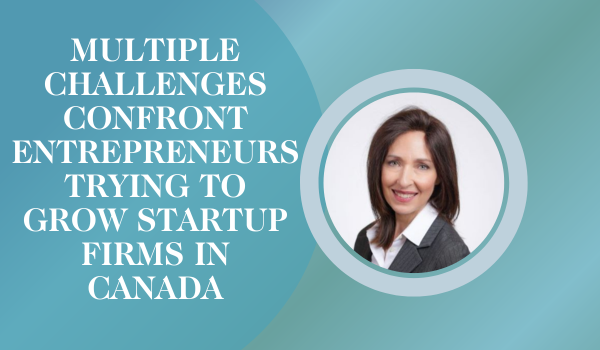Crucial links in Canada’s innovation ecosystem chain and knowledge economy are broken: Paul Wells
When it comes to Canada’s innovation ecosystem and knowledge economy, there’s the “ideal world” that elected politicians like to talk about.
 But veteran political journalist and author Paul Wells (photo at right) urges Canadians to “look at the world as it actually is.”
But veteran political journalist and author Paul Wells (photo at right) urges Canadians to “look at the world as it actually is.”
Several critical links in Canada’s innovation chain and knowledge economy are broken, Wells said in the concluding talk at Research Money’s 23rd Annual Conference, held in Ottawa.
“I see glaring problems with every part of this chain, from government to lab to community to economy, in the way they actually function,” said Wells, the inaugural journalist fellow-in-residence at the Munk School of Global Affairs & Public Policy at the University of Toronto. He has reported on science, research and innovation over several decades, including at Maclean’s magazine, the Toronto Star, The Global and Mail and the National Post.
In the ideal world, Wells said, the Canadian ecosystem values research, trusts scientists to find the best science, and moves ideas out of university laboratories into the best-performing companies to produce innovative products and services so Canada can prosper.
In this “lucky world,” funding for research granting agencies are increased incrementally every year, and government consults with a national advisory council of diverse stakeholders to ensure big science facilities have the budgets, staffing, supply chains and refurbishments they need. Government programs to encourage investment are easy to understand and access.
The resulting renaissance in Canada research leads to a rebirth of the Canadian university, Wells said. “Canadian higher education leads the knowledge revolution. Every one works together on this grand project for Canadian society.”
But science, research, innovation and the knowledge economy doesn’t work this way in the real world of Canada, Wells said.
“Governments love to announce a never-ending succession of programs that help business,” he said. “Every program they announce is piled onto the names of the last program.”
“All these different programs send contradictory signals,” he noted. He said he hears from businesses that these programs require substantial effort to qualify, distort business priorities, and have uncertain payoff. “It is never clear how long governments will stay loyal to these programs, even if businesses make the effort.”
“This is almost exactly what you would do if you wanted to instill a sense of learned helplessness in Canada’s private sector, rather than empowering them.”
The often bewildering plethora of programs and announcements is driven by a strategic communications strategy that has permeated government and most large organizations, Wells said.
“Amid the wild cacophony of the world, in which every telephone is a printing press and a TV studio and an infinite encyclopedia, all of us are pushing out terabytes of information every hour, and it never stops,” he said.
“These days it’s incredibly hard, as a direct result of that information, for anyone or any organization to get heard and paid attention to.”
In this world of strategic communications, it’s not just what you say that sends a message, Wells said. It’s where you stand, who you’re standing in front of, who you meet, how you dress, and what you do with your next $10 million of spending.
“So you have to push out a simple message, repeat it until you’re sick of it, repeat it some more and never deviate from it, if you want to be understood coherently as a business, an NGO, very much as a political party or as the government that emanates from that political party,” he said.
“You just have to never stop saying, ‘Axe the tax,’ ‘Build the home,’ ‘Fix the budget,’ ‘Stop the crime,’ ‘For the middle class and those working hard to join it.’”
Universities are no longer centres of the new economy and society
In the ideal world, policy decisions about funding research and innovation are based on peer review and scientific evidence, not political motivations or gain.
However, trying to separate governments from decisions about actions will also separate governments from the story they want to tell about themselves, Wells said.
To control their message and ensure it gets heard, politicians when they announce new programs, industry subsidies or other initiatives begin “by announcing the outcome, to start by telling how it’s going to end” and the problem the new funding, subsidy or other initiative will solve.
When academics and independent policy experts argue that government spending on science, research and innovation should be based on scientific evidence and peer review, “to people in government it sure sounds like you’re saying, ‘Take away government control over spending decisions,’” Wells said.
“Just as it would be hard to imagine a modern politician wearing a tutu or a duck suit into Parliament, it’s also hard to imagine them handing money to strangers for outcomes nobody can predict.”
Another critical piece of Canada’s research and innovation chain and knowledge economy that’s broken is universities, Wells said.
Government funding for universities has been declining steadily for decades, he said, at the same time that universities are being asked to do more in areas such as mental health, truth and reconciliation, work-integrated learning and inclusive excellence.
“Provincial governments have removed universities from the centre of their cosmology,” Wells said. “They’re not constructing a vision of society in which universities have a central place.”
With the decline in government funding, universities and colleges have had to get more and more of their revenue from tuition fees charged to Canadian and – increasingly over the last several years – international students.
Now governments, including the federal government which has implemented a cap on international student applications, are telling post-secondary institutions “they can’t go to that well any longer,” Wells said. “But governments haven’t opened up other sources of funding.”
Wells said in his conversations with families, “many of the families wonder why they bother. They see university as an annoying pause from real life, in which their children will be taught anti-social behaviour and either learn or have to dodge a discourse that offers them no tools for navigating the rest of their lives.”
“Many families plan further study in less glamorous institutions after university, essentially to repair the damage,” he said.
Universities have become increasingly alienated from a large part of society, Wells said. He cited former Harvard University president Larry Summers who said while people think of intellectual communities as being the most broad-minded of communities, “on the other hand they are actually among the most narrow, insular and inward-looking in the way they evaluate themselves and the way they think of the necessary decision making.”
Wells also pointed to U.S. writer and statistician Nate Silver in his Silver Bulletin substack, who wrote: “Public perceptions of higher education have declined rapidly, and I expect the problem to get worse.”
“It’s simply going to be hard to inspire a society to move from boards and mortar to mortar boards, when more and more people are starting to wonder why anybody would want a mortar board,” Wells said.
Businesses failing to take up and invest in new ideas
The other critical piece of Canada’s innovation chain that’s broken is the take-up of new ideas in the broader economy, he said.
“In our ideal world, this would happen smoothly because businesses wanted to be high value-added, because they were mostly left to their own wits, and because the policy tools that were offered were clear and easy to understand.”
Instead, he said, essentially Canada is eternally called upon to make a choice: Does the country want its human resources to be high skilled or low wages?
Wells noted that when Justin Trudeau announced his candidacy to lead the Liberal Party of Canada in 2012, he wrote that one of Canada’s goals should be to become Asia’s desired end-builder of livable cities – offering world-leading architecture, design, building materials and supply chains.
“What’s actually happened instead is that Canada has become a bustling destination for low-wage labour,” Wells said.
Just one indicator of this situation is Canada’s Temporary Foreign Worker Program, he said. By the end of 2023, foreign workers held 189,000 permits through the program – more than four times as many as in 2017, according to federal figures provided to The Globe and Mail.
Instead of investing in machinery and new manufacturing techniques, Canadian businesses “prefer to hire people to do simple tasks,” Wells said.
Canada’s investment in machinery and equipment as a share of GDP has been among the lowest of its peers for the past four decades. Canadian business investment in machinery and equipment is expected to decline, decreasing at an annualized rate of minus 2.2 per cent, to reach a value of $84.3 billion over the five years to 2024, according to a report by IBIS World.
In 2021, intellectual property investment in Canada per available worker was at the same level that it was more than two decades earlier, with labour productivity continuing to decline especially in the business sector.
In 2000, Wells covered Jean Chretien’s election campaign, where, he said, Chretien “spent about half his campaign at university laboratories, saying we need more of this.”
After his government was elected, Chretien followed through, creating the three federal research granting agencies and the Canada Foundation for Innovation. He also rotated some university presidents through the Prime Minister’s Office, to advise on policy decisions about science and research.
Based on current polls, it’s likely that the Conservative Party of Canada led by Pierre Poilievre will form Canada’s next government, Wells said. However, the Conservative Party’s policy position on science and innovation policy and the knowledge economy appears to be a mystery to the party itself, he said.
As the Official Opposition, “it’s so low on their priority list that they never bother,” Wells said. “I see no reason to expect a change in government at the federal level will make a positive difference in many of the phenomena I’ve described to you.”
R$
Events For Leaders in
Science, Tech, Innovation, and Policy
Discuss and learn from those in the know at our virtual and in-person events.
See Upcoming Events
You have 0 free articles remaining.
Don't miss out - start your free trial today.
Start your FREE trial Already a member? Log in
By using this website, you agree to our use of cookies. We use cookies to provide you with a great experience and to help our website run effectively in accordance with our Privacy Policy and Terms of Service.





